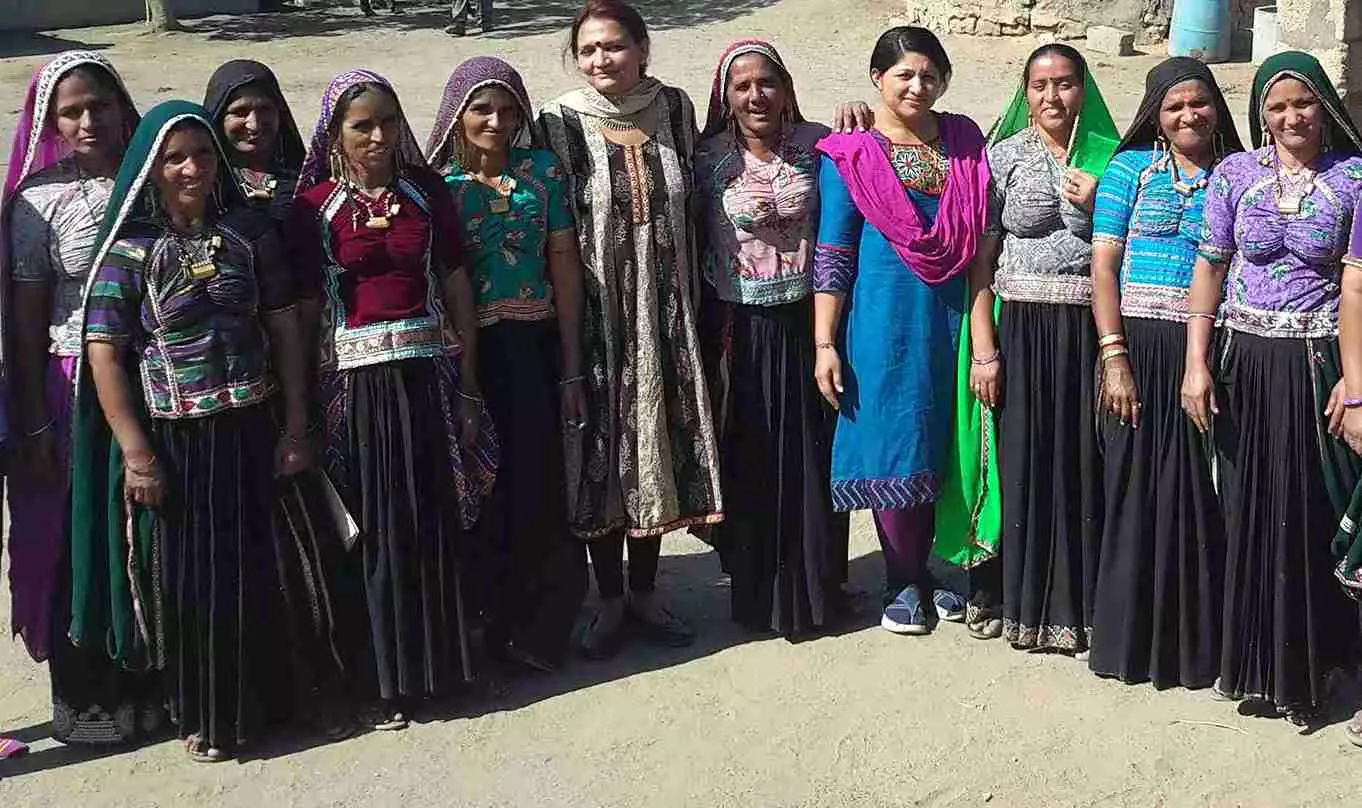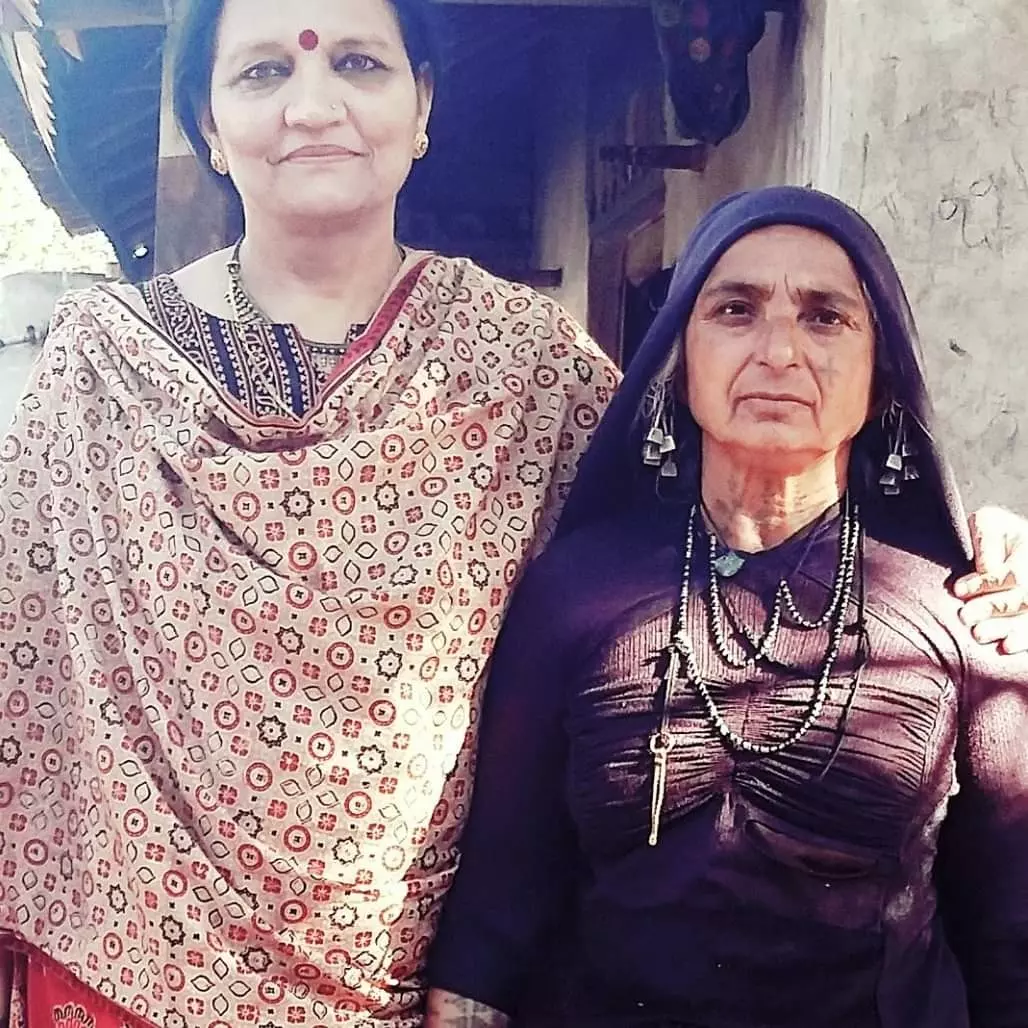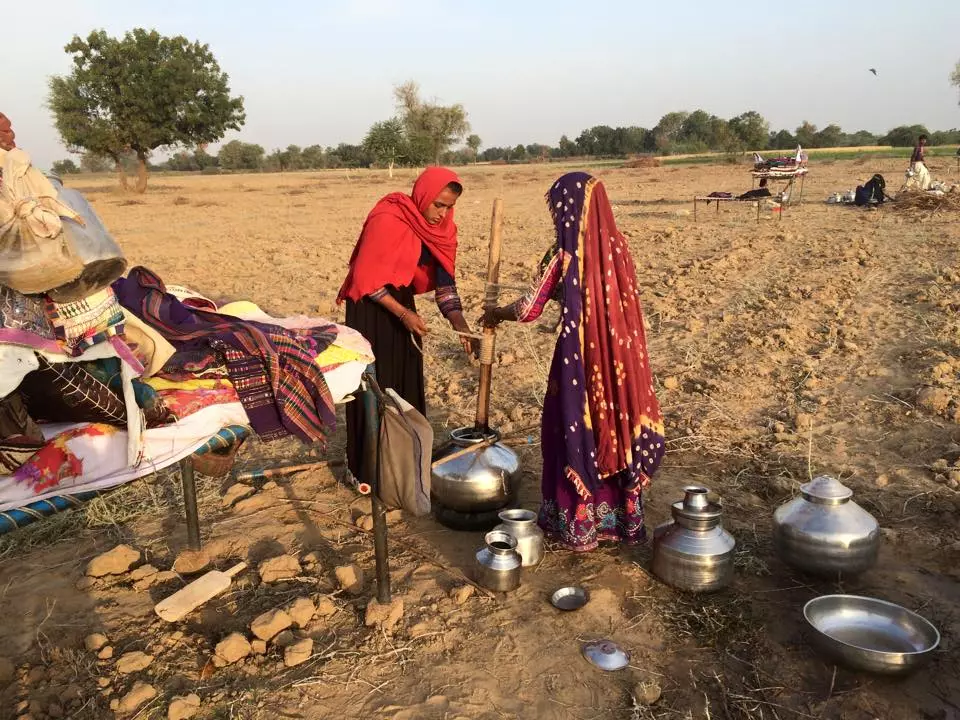
- Home
- India
- World
- Premium
- THE FEDERAL SPECIAL
- Analysis
- States
- Perspective
- Videos
- Sports
- Education
- Entertainment
- Elections
- Features
- Health
- Business
- Series
- In memoriam: Sheikh Mujibur Rahman
- Bishnoi's Men
- NEET TANGLE
- Economy Series
- Earth Day
- Kashmir’s Frozen Turbulence
- India@75
- The legend of Ramjanmabhoomi
- Liberalisation@30
- How to tame a dragon
- Celebrating biodiversity
- Farm Matters
- 50 days of solitude
- Bringing Migrants Home
- Budget 2020
- Jharkhand Votes
- The Federal Investigates
- The Federal Impact
- Vanishing Sand
- Gandhi @ 150
- Andhra Today
- Field report
- Operation Gulmarg
- Pandemic @1 Mn in India
- The Federal Year-End
- The Zero Year
- Science
- Brand studio
- Newsletter
- Elections 2024
- Events
How Maldhari women are fighting family to co-own land in north Gujarat

Shankuben Maldhari’s, a woman in her fifties lives in Vadnagar village of Patan district in north Gujarat, a village dominated by her community – Maldharis, traditionally pastoralists.Like any woman of her community, her day begins at around 5 am. After cleaning the cowshed and feeding her six cows, she finishes the household chores before she leaves for the plot of agrarian land, the...
Shankuben Maldhari’s, a woman in her fifties lives in Vadnagar village of Patan district in north Gujarat, a village dominated by her community – Maldharis, traditionally pastoralists.
Like any woman of her community, her day begins at around 5 am. After cleaning the cowshed and feeding her six cows, she finishes the household chores before she leaves for the plot of agrarian land, the family owns around 10 kilometres away.
“I wake up before day break and on some days even before sunrise. I clean the cowshed and give fodder and water to the cows. Then clean the house and cook for everyone. I pack my husband’s and my own tiffin boxes and leave for the khetar (agrarian land). There I work till maybe 4.30 or 5 in the evening. We don’t have watches on us. So, we stop at dusk when sun is going down and it begins to get dark. I come back home, cook dinner before I can retire for the day,” shares Shankuben.
“I don’t know my age, but I must be in my fifties. But all this work in the farmland makes me look older I think,” she says.

Neeta Maldhari (centre) with Maldhari women in Patan.
Shankuben was a just another Maldhari woman amongst the many who work invisibly, until February 2005, when she filed legal papers for co-owing her marital property along with her husband. This is when her life changed forever.
“For a few weeks nobody in the village knew about it. Then the officials came to our house to confirm and crosscheck the details. That’s when my father-in-law got to know and he was furious. He created a ruckus in front of the officials and verbally abused me. He then stormed out of the house and within hours the whole village knew that I had claimed my share in the marital property,” Shankuben tells The Federal.
“I remained the talk of the town for days. Elders of the community called for a social boycott of our family. Nobody would talk to me even in my own family. When I stepped out for work, men and women would stare at me like I am alien,” Shankuben said.
Shankuben’s marital family owns around two acres of land in Vadnagar taluka where she has been working for the last 27 years, since she married Randhabhai.
The Maldhari women are the primary agrarian workforce of the community as the men usually take cattle for grazing all day. Despite that they have no right on the land on which they work their whole lives.
The land is usually in the name of a male member of the family, who is either the father-in-law or in case of his demise, his son inherits the property. The women, whether daughters or daughters-in-law don’t inherit or own properties in the region.
However, in 2005 Shankuben decided to challenge the age-old system and filed a case to claim the legal ownership of her marital property.
“I remember the day vividly. It was mid-January in 2005 and a week after my third daughter was born. I was unwell and still recovering from child birth. I slept longer that day. My father-in-law woke up and began to complain that no work had been done. He did not consider that my body needed rest after childbirth. My husband too did not stand by me. He instead said that crops needed to be harvested that very day. Nobody helped me that day. I picked myself up and worked till evening despite my condition. That day I decided I decided to change my fate. But I was financially dependent on my husband who owned the farmland and the house we built together. I had no right on it,” shares Shankuben.
The next day, Shankuben went to see Neeta Maldhari, an activist who had been working to uplift the women of the community in Banaskantha and Patan districts in north Gujarat.

Neeta Maldhari with Shankuben.
“Shankuben came to me and said that the she wanted to come out of her situation. She was visibly unwell yet she came to meet me in Patan town without telling her family. But even through her weak physical demeanor, I could see that she was angry and determined to do something to change her plight,” Neeta Maldhari, a 43-year-old activist based in Ahmedabad, said.
“That’s when I began to counsel her. I told her that the situation of women in Maldhari community won’t change unless they own the property they work on. Women have no rights within the community. They aren’t allowed to own any land or property at their parental home as one day they will be married. When a woman is married, the man at her marital home controls the property,” Neeta Maldhari added.
“When I explained her that she is entitled to co-own her marital property along with her husband, she was shocked. In Maldhari or Rabari community, women don’t own property. If the husband dies, the son takes over. Women only get ownership after the demise of their husband if the couple has no male heir. Even in such situation, there are instances when the property has been taken over by the brother-in-law of the woman or even a nephew. The community condemns the idea of women owing property so much so that they call it panauti hayati (cursed ownership). They think it brings several years of bad luck to the family and the community,” shares Neeta Maldhari, who is a member of Maldhari Rural Action Group (MARAG), an NGO working among the Maldhari or Rabari community.
Noticeably, as per the 2005 amendment of the Hindu Succession Act, daughters have equal rights as sons in ancestral property, including coparcenary rights by birth. The amendment also states that daughters have the same rights as sons in inheriting both ancestral and self-acquired property, including the right to seek partition of the property.
“The 2005 amendment to the Hindu Succession Act was brought in retrospect, meaning that the daughters born before the amendment and whose fathers were deceased at the time or before of the amendment, are entitled to these rights. However, despite laws, the practice of keeping women away from property inheritance is rampant amongst the Maldhari community,” says Lalji Desai, an activist and lawyer by profession who handled Shankuben’s case.
“Most Maldhari women don’t know about the inheritance laws and are scared of talking about it as they are taught that it brings bad luck. We work among the women to bring awareness about legal rights. But the process has not been received well by the Maldhari men. However, despite all odds Shankuben managed to pursue her case and she is now the first woman of the community to claim legal joint ownership of her marital property,” Desai said.
Shaknuben beamed as she talks about it feels to have a property in her name.
“I got my property papers in December 2023. It had my name on it beside my husband’s name,” she said.
“Initially, they won’t accept the application at the talati (taluka revenue) office. They told it’s not allowed and that I should remove my name and bring back the application again. Neetaben had introduced me to Laljibhai who helped with the process. Even then I was harassed for years. Officials would come home to check if my husband was really alive and if I was living with someone else. My son still doesn’t talk to me. But it has all been worth the struggle,” she said.
Shankuben’s struggle of more than 20 years to get joint ownership of the property while husbands are still alive has prompted many women to follow the path.
“This system has been going on for ages. It’s the women who slog on the farmland when men are away but we have no right on the same land. In our parental home, we are not considered a family since the day we are born. We grow up hearing we belong to some other family where we will be married. When we marry, it is either the father-in-law or the husband who controls the property,” said Ramiben Rabari, another Maldhari woman of the village who was inspired by Shankuben and claimed her share in the marital property in 2020.

Ramiben on her farmland
Shankuben now encourages other women to claim their property rights.
“We (women) milk the cows and then line up the sale of the milk with local diaries. We work on farm and go to market to buy seeds and fertilizers. Then we do the sowing, irrigating and harvesting. Then how does it make sense that men own all this property and we don’t have any right in it. It is my khetar (farmland), I have worked there in sun and rain for years. So I too should have a share in it,” Shankuben would say to the women in the village.
Ramiben also accompanies Shankuben these days.
“Women can’t be expected to work quietly. Everyone who works gets some payment then why should we work for free,” said Ramiben, who is still pursuing her case for transferring her 3 acres of land and a house jointly in her and husband Rambhai’s name.
